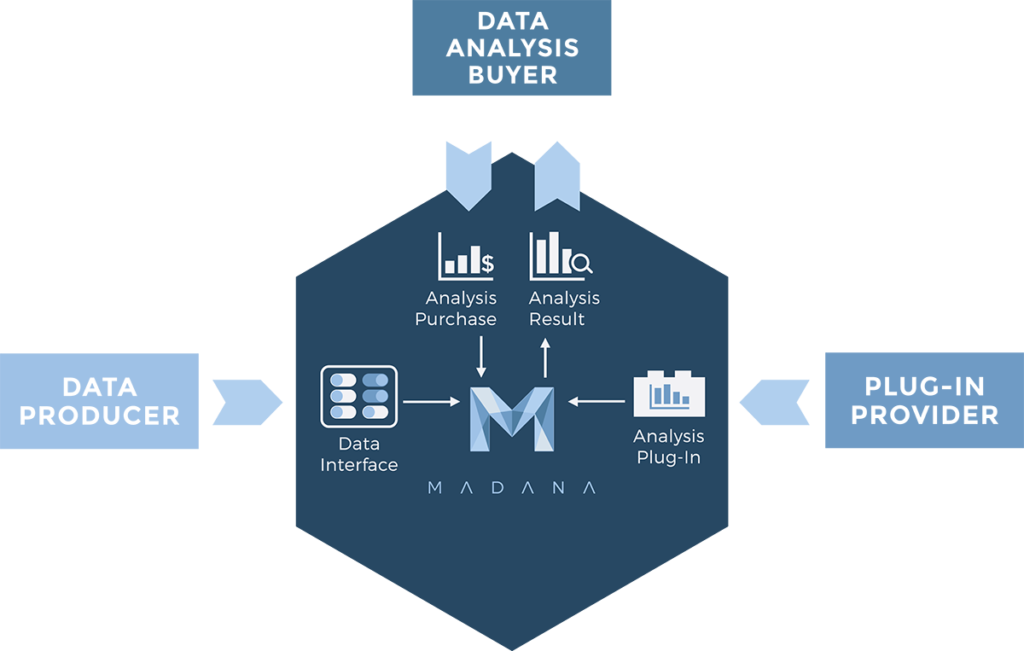All the major Internet giants, including Facebook, Google, and Amazon, have been able to build their empires based on their users’ data and are now among the most influential companies in the world. But what do we—as data suppliers—get from these corporations for training and refining their algorithms? To be fair, we are usually allowed to use their services free of charge, but is this really a fair compensation?
Internet users are not only feeding companies with more and more private data, they are, at the same time, giving up their data ownership. And what happens to them afterwards, is not entirely up to us.
MADANA Using Data while Preserving Privacy
Data leaks, such as last year with Facebook, show that our data is usually not secure with these companies. Besides, enterprises such as Facebook and Amazon, in particular, are very attractive targets for hackers due to the quantity of available data.
Internet pioneer, Jaron Lanier, recently also urged that the Internet should be modernized. Moving away from a free-of-charge culture towards one in which users are also paid for their data.
The startup MADANA is now developing a system that may revolutionise the way the Internet handles data. The software should allow you to sell your data without losing your proprietary rights.
For instance, if MADANA’s software is installed on your smartphone, location data and other metadata can be collected. This data is then encrypted and analysed. However, the buyer of the data does not receive a full dataset, but a complete data analysis.
Data Is not Being Sold But Rather Rented out
Nicolas Pettican, the Head of Development at MADANA, explained to us why it is better for companies not to resell their data directly: “If companies have a lot of data and are not able to use it, but you could start monetising it somehow, you don’t have to sell the whole dataset to someone else, but rather rent it. We create an environment where we can encrypt this data, analyse it and the people on the other end would only get the analysis insights and would not actually get the data. You keep ownership of your data.”

MADANA uses the so-called Trusted Execution Environments (TEE) for the data analysis. These are protected hardware modules whose processing cannot be seen from the outside. In this way, the raw data remains protected and only the results of the analysis in an encrypted form are available to the buyer. This procedure also allows sensitive and personal data to be evaluated without the buyer being able to draw conclusions about the individuals.
Additionally, public institutions can also benefit from MADANA’s software, as Nicolas Pettican explained to us: “We get companies that have the data in their systems but can’t access it because of legal reasons, and so they come to us and say ‘hey can you find a way that we can utilise this data, without having to infringe any laws.’”
MADANA – the Pioneer of the Blockchain Movement in Germany
The founders of Madana, Christian Junger and Dieter Schule, met each other during their studies at RWTH Aachen University. In 2014, the duo co-founded the Bitcoin Aachen Group. This made them one of the first in Germany to officially address the topic of blockchain and organise meetups on this topic.
Nicolas Pettican explained to us how Madana utilises the Blockchain technology: “We also taking the decentralised nature of blockchain to a new level, so we’re not necessarily using it just as as a digital ledger to keep transactions, which you want to do in this case once we go bigger. At the same time we are creating a decentralised pool of information, so lots of different companies will have our software installed, which means that eventually other companies will be able to dissipate or use data that is from different industries and combine it into one.”
MADANA is now one of the first blockchain companies to operate entirely under German law. At the end of last year, the start-up completed an ICO audited by the Federal Financial Supervisory Authority (BaFin). The project on LISK’s sidechain received a lot of attention, because the ICO represented a major test for LISK as a competitor to the already established Ethereum.
Nicolas also shared with us MADANAS’s plans for the future: “We want to become the best for data ecosystems in Europe. So any ecosystem that requires data to be analysed in a secure way, we’re going to be go-to company, that’s our goal.”


